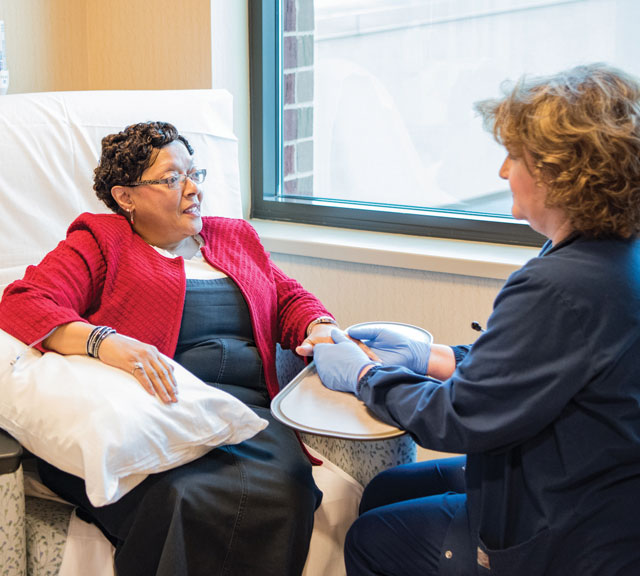Understanding Rare Female Cancers: Vulvar and Vaginal

Answer a few questions and we'll provide you with a list of primary care providers that best fit your needs.
There’s a long list of good reasons to get an annual gynecologic exam. Part of that list is the possibility of detecting two of the most rare gynecologic cancers affecting women’s reproductive organs: vaginal and vulvar cancers.
Vaginal and vulvar cancers have symptoms such as bleeding, pain and burning that are also common with a number of less serious conditions. Medical providers can help identify whether you have something that’s easily treated or a cancer that requires an in-depth care plan.
As with other cancers, vaginal and vulvar cancers are most effectively treated when detected early. Getting regular checkups, not smoking and using safe sexual practices or getting a vaccine to avoid the human papillomavirus are all ways to help prevent getting these rare cancers.
Vaginal Cancer
Cancer of the vagina occurs in 1 of only 1,100 women — affecting about 4,800 women in the U.S. annually, mostly over age 60.
Your vagina, also called the birth canal, is a tube-like passage that connects the lower part of the uterus (called the cervix) to the outside of the body. During menstrual periods, blood flows out of the body through the vagina.
Different types of cancer cells can develop in the vagina. The most common are vaginal squamous cell carcinomas, which grow in the lining of the vagina and generally develop over years. Precancerous changes called vaginal intraepithelial neoplasia (VAIN) may be the first signs of cancer. Other, more rare types of vaginal cancer originate in the glands of the vagina (adenocarcinomas), in the lower or outer portion of the vagina (a form of skin cancer called melanoma) or in the muscular wall of the vagina (called sarcomas).
Many vaginal cancers don’t produce symptoms until they’ve reached an advanced stage. Common symptoms you might experience include abnormal vaginal bleeding or discharge, painful intercourse or a lump that can be felt. Painful urination, constipation and continuous pelvic pain can be signs of more advanced cancer.
Vaginal and vulvar cancers have symptoms such as bleeding, pain and burning that are also common with a number of less serious conditions.
Diagnosis and Treatment for Vaginal Cancer
Your doctor or health care provider will ask you about symptoms and examine your vagina. Further testing may include taking a tissue sample from a suspicious area or using a scope to better visualize the vagina.
If testing identifies a cancer, there are several treatment options:
- Surgery can be used to remove a tumor.
- Radiation therapy can direct high-energy radiation beams at a cancerous area to kill cancer cells (radiation seeds can sometimes be used as well).
- Chemotherapy can be used to travel in the bloodstream to shrink a tumor and kill cancer cells throughout the body.
Five-year survival rates for vaginal cancer can be as high as 84 percent for early-stage cancers and about 57 percent for stage III and IV cancers that have spread, according to the American Cancer Society.
Vulvar Cancer

Vulvar cancer affects 1 in 333 women over a lifetime, with about 6,000 new cases reported each year. More than half are in women over age 70. Cases in younger women are most often linked to infection with high-risk types of the human papillomavirus.
The vulva is the external part of the female reproductive system and includes two sets of skin folds called the labia. Vulvar cancer most frequently affects the inner edges of the labia.
Diagnosis and Treatment for Vulvar Cancer
See your health care provider if you are experiencing abnormal vaginal bleeding or discharge, or itching, pain or burning that doesn’t go away.
Your doctor will examine your skin for any unusual coloring, thickening skin, sores or lumps. If your doctor is concerned about a particular area of skin, you may need a biopsy. The doctor will remove a small piece of tissue and send it to the lab for further study.
If you have vulvar cancer, treatment options are similar to those for vaginal cancer.
Most women with vulvar cancer will have surgery to remove the cancer. High-energy radiation beams can be used to kill cancer cells by shrinking the tumor before surgery or killing any stray cancer cells after surgery. Chemotherapy is used to destroy cancer cells that may have spread throughout the body.
According to the American Cancer Society, five-year survival rates are high for stage I cancer — about 86 percent — but only about 16 percent of women survive with later stages of this cancer.
Clinical trials of new treatments may offer additional options for women with either type of cancer.
Answer a few questions and we'll provide you with a list of primary care providers that best fit your needs.
Source: American Cancer Society; Centers for Disease Control and Prevention

